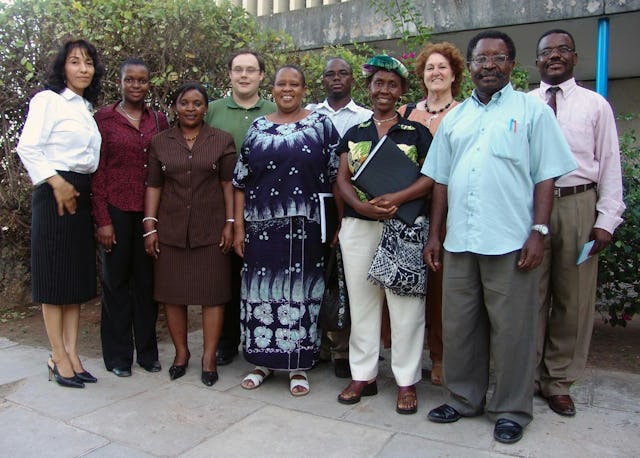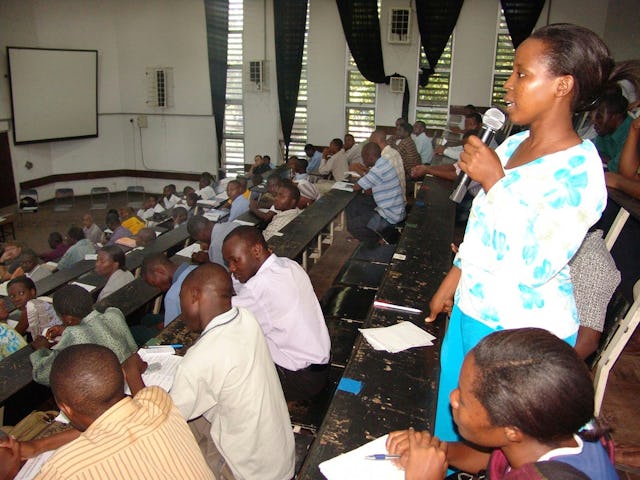Families and youth identified as keys to reducing poverty
DAR ES SALAAM, Tanzania — Strengthening families and empowering youth are two key factors in poverty reduction, said experts at a one-day symposium held here on 21 October 2006.
Organized by the Dar es Salaam Union Student Organisation (DARUSO) and the Baha'i community of Tanzania, the symposium examined the theme "The Role of Family and Youth in Establishing Brighter Communities."
The event, held on United Nations Day, focused on the Millennium Development Goals (MDGs), a series of targets in the fight against poverty, which were adopted by the United Nations Millennium Summit in 2000.
"Basically everybody comes from the family," said Stella M. Manyanya, a member of Parliament. "It is at the family whereby the true reflection of the MDGs achievement can be observed in individual basis instead of generalization."
Youth, especially, will provide new ideas and are a potential labor resource, said Ms. Manyanya.
Shalli Tumaini of DARUSO said the MDGs "are a recognition that over half a century after the end of WW II, the world remains very far from the ideals of harmony, prosperity and peace inspired by the end of the war.
"For Africa, particularly, the MDGs provide an impetus to reverse deterioration in human development," said Ms. Tumaini.
Other panelists included Adeline Kimambo of Christian Social Security Council; J. Abunuwasi Mwami, senior lecturer of the Department of Sociology and Anthropology, University of Dar es Salaam; and Killian Nango of the Youth of United Nations Association of Tanzania (YUNA).
"Family is the foundation of society," said Mr. Nango, echoing the theme of the symposium. "Having strong families means that you will have strong leaders."
Elieshi Lema, another panelist and author of the book "Parched Earth," presented a paper that outlined some of the problems facing families and youth in the region. Those challenges include rural-to-urban migration for jobs, increased drug abuse, domestic violence, and the lack of entrepreneurship, she said.
However, strong families can help overcome these problems by promoting integrity, education, and effective interpersonal leadership, she said.
"Families have to join up and improve societal undertakings like educational, social economic, environmental, cultural, healthy even religious undertakings in their society or community for a bright future of communities," Ms. Lema said.
More than 100 people attended, including representatives from the academic and diplomatic communities, nongovernmental organizations, and faith-based groups.
Sohaila Loftus, a representative of the Baha'i community of Tanzania, stressed the importance of the education of women in achieving the goals of reducing poverty, improving health, and promoting education.
It is, she said, "essential for the child to interact face-to-face with an educated, intelligent, loving, caring mother who will give this child the moral and spiritual grounding it needs in order to grow into an effective adult."
Ms. Loftus also stressed the importance of religion and spirituality as the keys to creating a strong family.
"Families should strive to raise children who will choose education and good-will," she said. "Children should be brought up to bend their wills to the service of the human race, seeing their roles as contributors to communities. These are faith-based concepts."
Both the participants and the organizers felt that the symposium was rewarding.
"There was a high level of thought-provoking discussion and commentary from members of the audience, particularly the university students," said Bryan Tribble, a member of the Office of External Affairs of the Baha'i community of Tanzania.
One outcome of the event was the formation of a team of some two dozen students, young professionals, journalists, and NGO representatives, who pledged to join in an effort led by the Baha'i s of Tanzania and DARUSO to achieve the Millennium goals.
"They will continue the dialogue, refine ideas about the contributions that youth and families can make and present their findings to the government," Mr. Tribble said.
Mitra Deliri, director of the Office of External Affairs of the Baha'i community of Tanzania added: "The gathering brought together various organizations who realized that the only way to achieve a meaningful development and fight poverty is to unite and combine efforts by different groups. And that this unity will strengthen the community and society at large."

